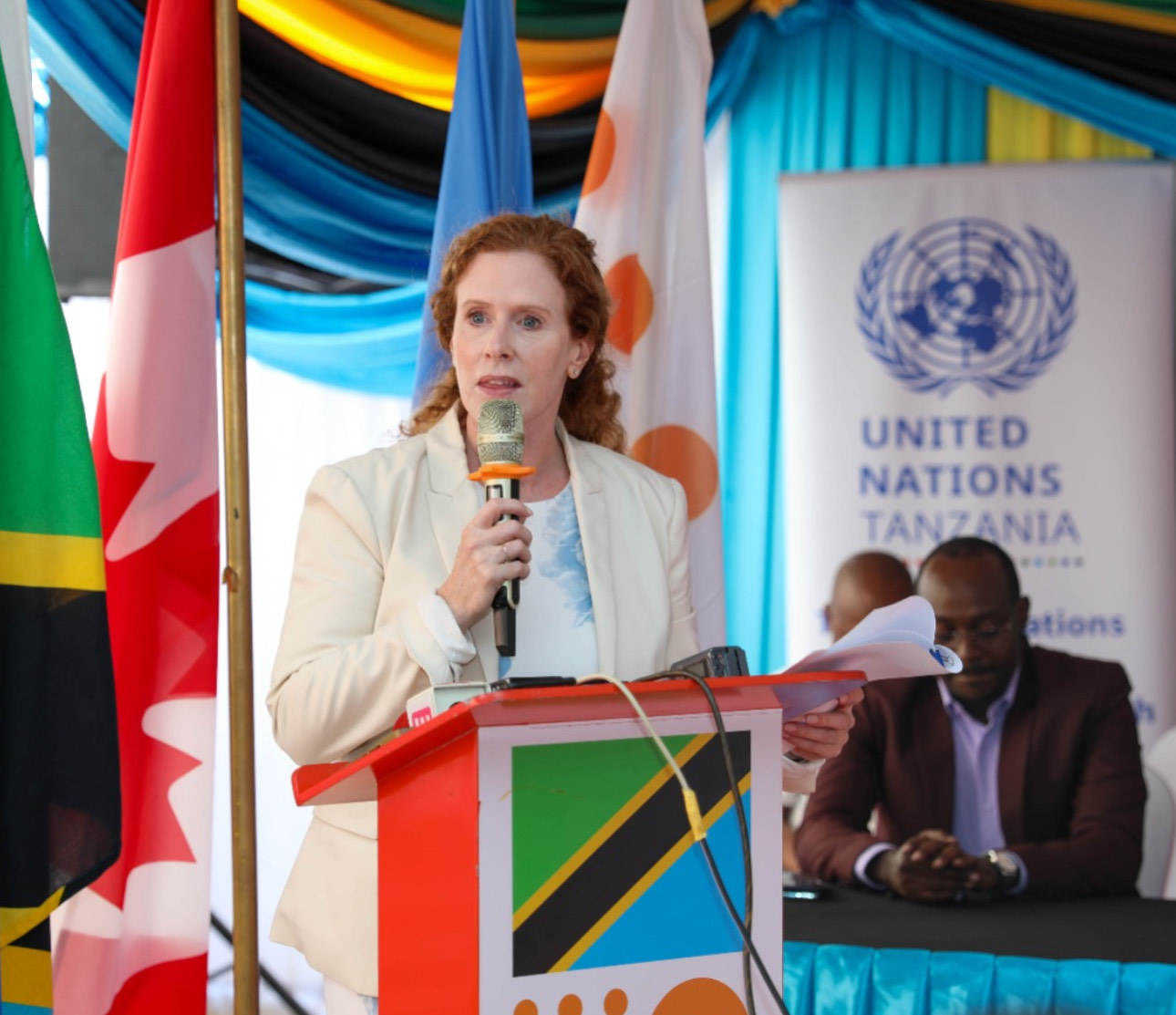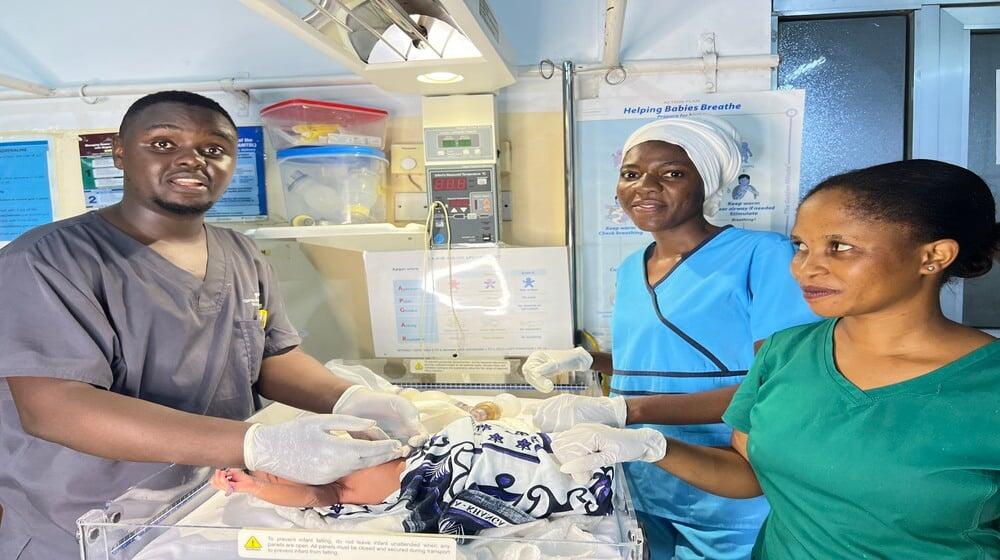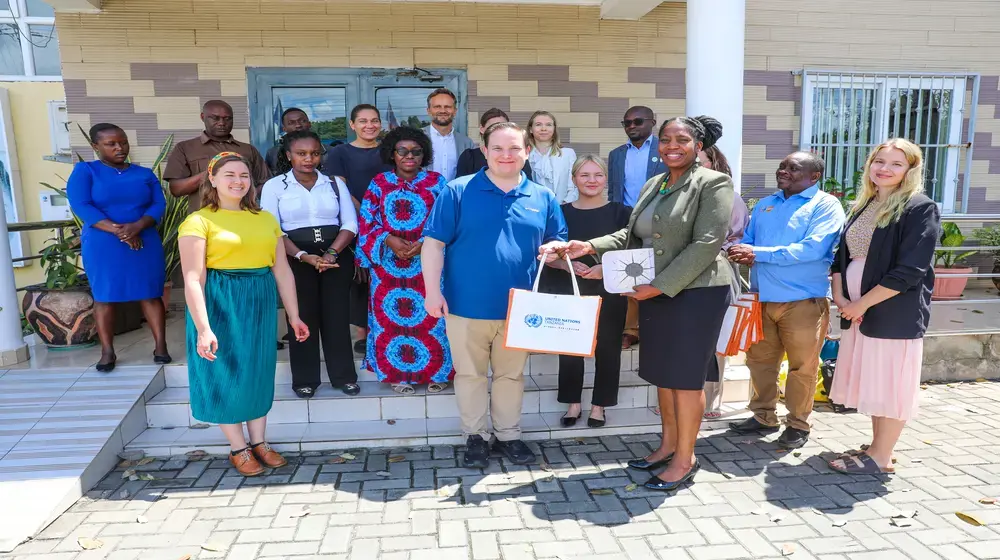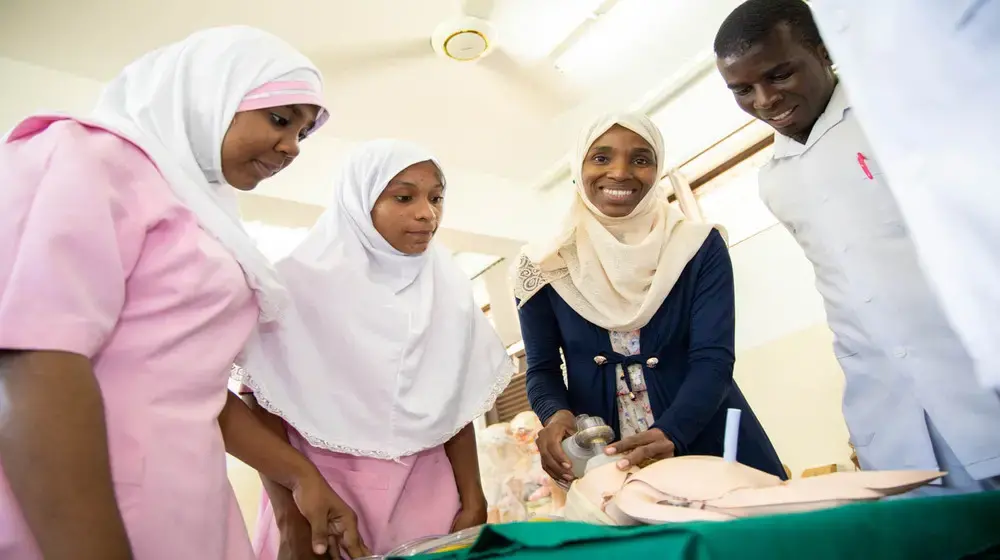“Life starts in a hands of midwives, no woman should die giving life, and even One maternal death, is one too many.
Melissa McNeli Barrett, UNFPA Deputy Representative, in the United Republic of Tanzania
The High Commission of Canada in Tanzania and UNFPA, the United Nations sexual and reproductive health agency, today in Dar Es Salaam, Tanzania, together we have launched the 7 years, Thamini Uzazi Salama Project - Strengthening Midwifery in Tanzania’ (SMIT) Project. The SMIT Project was developed to address challenges in availability of skilled midwives in the country to contribute to the reduction of maternal and newborn mortality in the country.

“On this project launch, the Government, Global affairs Canada and UNFPA confirm the commitment to work together to strengthen the midwifrey in the country specifically Dar Es Salaam and Shinyanga regions. The government and develoment patners (Canada and UNFPA) do so by recognizing that Tanzania needs skilled midwives now more than ever, in order to protect the lives of women and babies”. Said Hon. Albert Chalamila, Dar Es Salaam Regional Commissioner.
Every two minutes, a woman dies from pregnancy-related causes - either during pregnancy, childbirth or immediately after childbirth. And the presence of a skilled midwife can save her. Additional midwives are needed to improve maternal health, reduce child mortality, and combat HIV.

"The presence of a midwife at birth can mean the difference between life and death, and protects the life of the mother and the child by recognizing problems early, when the situation can still be controlled, and by intervening quickly”. Said Melissa Mc-Neil Barrett, Officer in-charge- UNFPA Deputy Representative, in the United Republic of Tanzania
Project Purpose and objectives: ‘Strengthening Midwifery in Tanzania’ project intends to increase the availability of skilled and empowered midwives to contribute to the reduction of maternal and newborn mortality and provide a full range of other reproductive, maternal, new-born, child, and adolescent health.The project will focus on strengthening a gender responsive working environment for the midwives both pre- and in-service. In-services midwives will be offered opportunities to upgrade their skills through continuous professional development.

“Midwives do not only need supplies and equipment. They also require extensive training to safely manage childbirth and to be able to recognize life-threatening complications”. Said Helen Fytche, Head of Cooperation and acting High Commissioner Canada in Tanzania.
In addition to delivering care throughout pregnancy, during childbirth and in the post-delivery period, midwives also provide comprehensive sexual and reproductive health services, such as family planning counselling. All these services reduce maternal death rates and improve child survival. The project builds on, and amplifies the work already being done by UNFPA and partners involved in this project - Amref Canada and Canadian Association of Midwives (CAM), and their collaborators, in advocating for quality midwifery services and recognition of midwifery as a distinct profession within the health care system.
The project will be implemented in three districts of the Shinyanga region (Shinyanga rural, Kahama, and Kishapu) and three municipal councils of the Dar es Salaam region (Temeke, Ilala, and Kinondoni); Direct beneficiaries: 1,071,852 pregnant women delivering in the targeted health facilities and 805,945 new-borns delivered in the project targeted health facilities. The project will benefit 180 dispensaries, 28 health centres and 12 hospitals in these two regions. Moreover, the project is expected to benefit communities living in 28 wards and 112 villages/streets in these two regions. The Government of Canada financially supports this 7-year project through the Global Affairs Canada (GAC) with budget worthy CAD $11,750,000 (Equivalent to USD $ 8,564,000 or TZS 22,085,065,000)
Key Pillars of the Project: Pre and in-service education programme for midwives in Tanzania; Health service delivery by midwives and Enabling environment to facilitate gender-responsive midwifery practice in Tanzania. The ‘Strengthening Midwifery in Tanzania (SMIT) Project’ launched today is officially titled: “Thamini Uzazi Salama Project”, with its tagline “Wezesha Mkunga Kwa Uzazi Salama”
- NOTE TO THE EDITOR-
Maternal and newborn mortality continues to be one of the major public health issues particularly for developing countries like Tanzania. Globally, every two minutes, a woman dies from pregnancy-related causes - either during pregnancy, childbirth or postpartum. Newborn deaths (deaths within the first 28 days of life) account for 46 percent of all under-five deaths, which translates to about 2.6 million newborn deaths in the first month of life.
In Tanzania, maternal mortality ratio (MMR) has persistently been high for over decade from 578 per 100,000 live births in 2004/2005 to 454 per 100,000 live births in 2010 and 556 per 100,000 live births in 2015/2016[1]. However, the recent Tanzania Demographic Health and Malaria Survey (TDHS, 2022) has shown a sharp decline in MMR or pregnancy related mortality to 104 per 100,000 live births. Unfortunately the progress on the newborn has remained relatively the same (24 per 1000 live births). In Tanzania, 1 in 23 children does not survive until their 5th birthday. Persistent high newborn mortality is compromising the progress made overall under five mortality reductions.
Evidence shows that if skilled health professionals attend a pregnant woman during labor, delivery, and early postpartum period, this can significantly reduce both maternal and newborn morbidity and mortality by preventing or managing most obstetric complications. Skilled health professionals can be nurses (3+ years of training), midwives (3+ years of training) or doctors (6+ years of training). For most resource-constrained countries in Africa such as Tanzania, training of midwives is the most cost effective way of providing women centered, compassionate and respectful care for pregnant women and their newborns.
Within an enabling environment, midwives trained to international standards can provide nearly all of the essential care needed for women and newborns. Unlike other health professionals, midwives dedicate 100 per cent of their time in providing sexual reproductive health services to women and girls including attending delivery and managing obstetric complications.
However, despite this fact, there are several gaps in the existing ‘Nurse-Midwifery’ Training Programme, which currently does not meet international training standards. For example, a Tanzanian midwife's exposure time for midwifery lessons is four times lower than for a midwife who meets the standards recognized by the International Confederation of Midwives. This compromises the provision of quality midwifery care.
According to the Population and Housing Census (2022), the population of the URT is 61.7 million (31.6 million women and 30 million men). Tanzania is adding over one million people to its population annually. The nurse-midwife availability is only 3.6 per 10,000 population in Tanzania. Hence, the annual increase in population means more pressure on the lean and poorly paid midwives, causing burnout, low motivation and more challenges to meet the reproductive maternal, newborn, child and adolescent health (RMNCAH) services of the population these nurse-midwives serve.
Evidence shows that universal coverage of globally standard midwife-delivered interventions could avert 67% of maternal deaths, 64% of neonatal deaths and 65% of stillbirths. Furthermore, midwives who are educated and regulated to international standards and working in enabling environments can provide up to 87% of essential sexual and reproductive health services (State of the World Midwifery [SOWMy] Report, 2022).
It is in this context that the ‘Strengthening Midwifery in Tanzania (SMIT) Project’ was developed to address some of the above pressing challenges and contribute to the reduction of maternal and newborn mortality in the country.
[1] National Bureau of Statistic (NBS), Tanzania Demographic Health Survey (TDHS) reports (2005/06, 2010, 2015/16)
For Media Queries and further information please contact:
Dr. Warren Bright, Communications Analyst,
UNFPA in the United Republic of Tanzania,
Email: bwarren@unfpa.org, Mobile: +255 764 43 44 45




